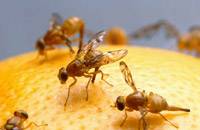Funny Business Video Gallery
Fri. May 18 2007 | 07 17 00[02:31]
The latest from CNBC.com blogs, including an update on Microsoft's new acquisition, with Jim Goldman, CNBC Silicon Valle...

May.18
1:16 AM ET
Friday, 18 May 2007
Best Waste, Feminine Colons & Wacky World
Best Waste of Money This Month
Someone please email me at funnybusiness@cnbc.com
to explain how the following research can benefit humankind. I will
post interesting replies, and the reader with the best explanation will
win a CNBC cap (I know I have one around here somewhere).
 |
Common Fruit Fly |
Anyhow, researchers thought that in the white room... with black curtains (kidding, a little Clapton humor there), the flies would move randomly. But they didn't. Okay, what I just told you in English is described below by the scientists themselves: "Naively, if the production of torque spikes in our featureless or uniform environment were due to random noise in the Drosophila brain or from any uncontrollable input, the time intervals between spikes (inter-spike interval, ISI) should reflect this stochasticity, much like the hiss of static from a radio between stations."
But the movements weren't random, they weren't like the "hiss of static." So the scientists ran through a host of computer models and finally figured out the flies are choosing where to turn.
The "groundbreaking study" is reported in the latest issue of an online journal called PloS ONE. The lead author, Alexander Maye of the University of Hamburg, says, "I would have never guessed that simple flies who otherwise keep bouncing off the same window have the capacity for nonrandom spontaneity if given the chance." And I would have never guessed you'd care.
Here's more details -- and a video of a tethered fly.
Best Press Release Headline
"Women Have Colons, Too"
And here I thought we only had semi-colons. ;)
It's a Wacky World
I went to Africa in January with a church group to help at some rescue centers for abandoned babies. Yeah, aren't I special? (By the way, if you'd actually like to help, look here. I've seen the operations, and they are first rate).
That's not the point I'm making here. The point is… well… it's a funny world. A couple weeks ago, I emailed one of the Kenyan missionaries running a New Life Home to say I'd done a story on the horse that won America's most famous horse race, the Kentucky Derby, and the horse is probably worth $30 million. He thinks I made that up.
Now I'm emailing him about how a painting by Andy Warhol about a car crash has sold for $71 million. He will think I'm telling a joke again. I'm wondering if it's safe to tell him that the domain name Porn.com just sold for $9.5 million, the second most expensive domain name ever, behind… Sex.com, which sold for more than $11 million last year. Nah. He'd never believe me.
Comments? Funny Stories? Email funnybusiness@cnbc.com
© 2007 CNBC, Inc. All Rights Reserved
Permalink: http://www.cnbc.com/id/18730883




